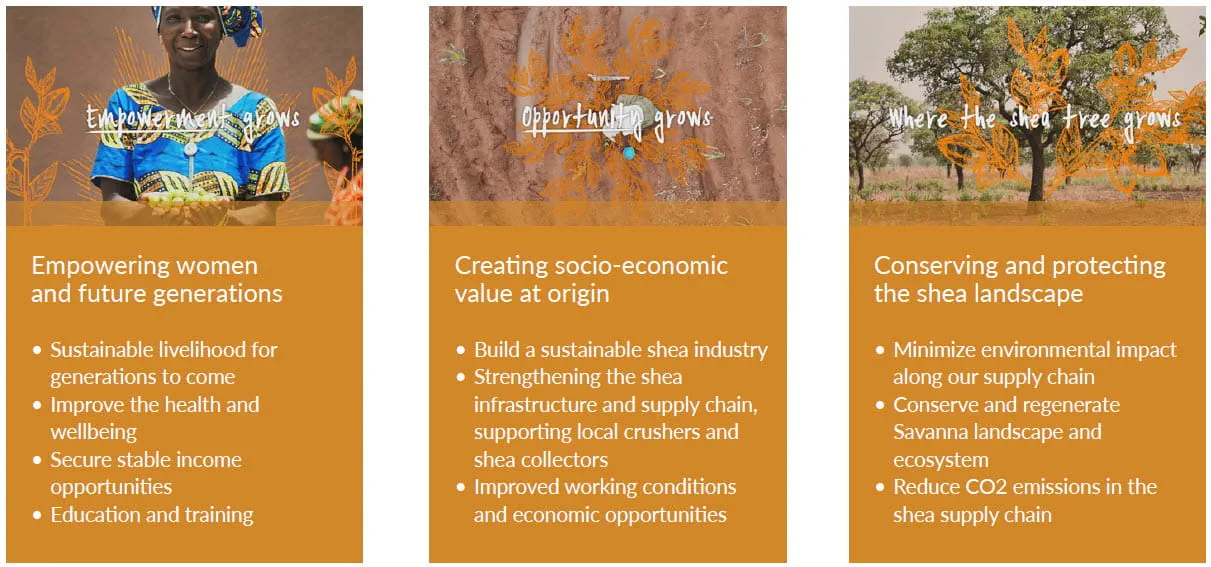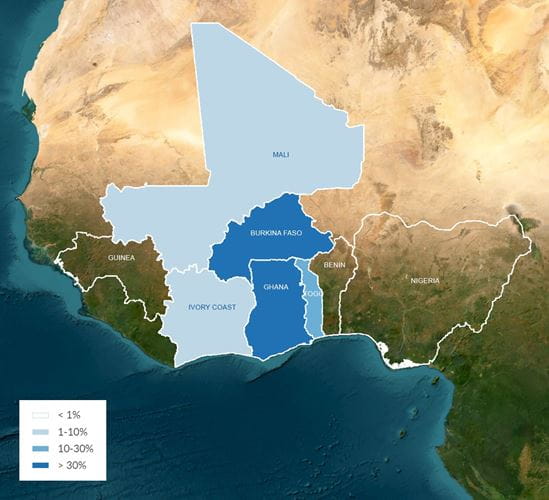Shea butter comes from the shea nut and is a naturally grown crop in the West African Savannah park lands. There are no organized shea plantations. More fondly known as the ‘tree of life’, the shea tree has profound impact on many lives, not only in its use but also in how it is produced and sourced. Shea butter is well known for its array of nourishing properties and is therefore used widely as an ingredient in food and personal care products worldwide.
However, shea does so much more than nourish the consumers that use it. Shea helps the communities of its place of origin thrive. The collection of shea nuts is primarily done by women who represent an integral part of the shea supply chain. This empowers them to transform their own lives, the lives of their children, families and their entire communities.
We are committed to positively impact the livelihoods and communities of shea collecting women and in turn, create value to the countries and communities where shea originates from - ultimately transforming lives and securing livelihoods for the generations to come.
For over 50 years, Bunge has played a leading role in the sourcing and processing of shea as an important raw material. We believe that the key to building a better tomorrow for shea communities is by being deeply invested in their growth and prosperity. This belief is what brought our Shea Sustainability program 'Where Life Grows' to life. It aims to empower shea collecting women and future generations, create socio-economic value in their communities, and conserve and regenerate the shea landscape in the region.
‘Support 400,000 shea women and their families and plant at least 100,000 trees’

Updated on February 21st, 2024
Our shea sustainability initiatives underpin our vision to build 21st century value chains that are transparent, verified sustainable and create positive impact on the ground in support of the UN Sustainable Development Goals across the areas of health and education, socio-economic development and environmental management.
We have long been committed to strengthening the shea infrastructure and supply chain, supporting local crushers and shea collectors with improved working conditions and economic opportunities, thereby giving West–Africans a sustainable shea industry. We have invested in a local shea fractionation plant in Tema, Ghana, which was commissioned in 2019.




In April 2021, Bunge Loders Croklaan donated 200 stoves to women in the Tamal area. These st...
Bringing together partners from our shea supply chain to implement change
For shea nut crusher MaliShi, sustainability is a critical part of day-to-day operations. To...
Communities in the savanna ecological area may struggle with land degradation and loss of so...
Because the shea nut is a naturally grown crop rather than a farm or plantation-grown crop, there is no globally recognized sustainability certification for shea. In line with our overall commitment towards responsible sourcing, we have taken several steps to certify our shea supply chain against a Globally recognized sustainability standard.
In 2011, we asked the Rainforest Alliance (RFA) to audit our shea supply chain in West Africa based on the SAN standards, evaluating environmental, social and economic aspects. The RFA report concluded that there were no sustainability hotspots identified in our supply chain but included recommendations for areas that would benefit from future attention. These recommendations were implemented in our Shea Sustainability program. In 2014 RFA conducted a follow up audit, which acknowledged that the recommendations from 2011 were actively implemented and again, no sustainability hotspots were identified.
